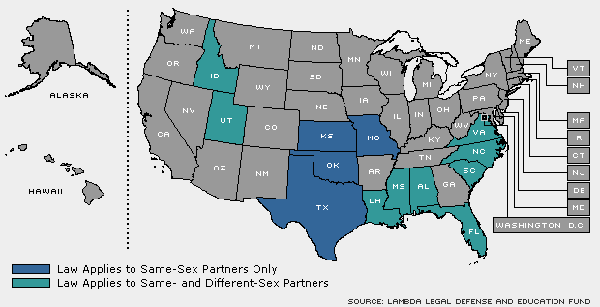Part 1: Criminal Sodomy and Privacy
U.S. laws against sodomy focus on oral or anal sex. Though the laws generally prohibit the activities of both heterosexual as well as homosexual couples, the enforcement of such laws has often targeted homosexual sex between men. In 1960 every state had a law against sodomy. Since then, 37 states have had their sodomy laws repealed by lawmakers or blocked by state courts. Of the 13 states which continued to have sodomy laws (see chart below), Texas , Kansas , Oklahoma , and Missouri prohibit sodomy between same-sex couples while the rest (including North Carolina ) prohibit sodomy for everyone. This changed in 2003 when the U.S. Supreme court struck down state sodomy laws 6-3 in Lawrence v. Texas . Part of the decision was motivated by concern for privacy such that private consenting sexual activities between adults should not be criminalized. In order to make sense of this, some legal background in privacy is required. 
What is privacy? Privacy is a form of liberty. Rather than the liberty to do X, privacy is the liberty to exclude others from knowing about or viewing your X-ing. What consensual sexual activities between adults in private, if any, can be considered crimes? Several legal cases have played a vital role in determining privacy's ability to protect activities from criminal prosecution. Let us examine each case briefly.
Griswold v. Connecticut (1965)
 This case revolved around a law that read: "Any person who uses any drug, medicinal article or instrument for the purpose of preventing conception shall be fined not less than fifty dollars or imprisoned not less than sixty days nor more than one year or be both fined and imprisoned." It went on to declare that: "Any person who assists, abets, counsels, causes, hires or commands another to commit any offense may be prosecuted and punished as if he were the principle offender." Griswold (the executive director of Planned Parenthood in Connecticut ) and Buxton (the medical director of a Planned Parenthood clinic in Connecticut ) were charged and found guilty for giving contraceptive information, instruction, and medical advice to married couples.
This case revolved around a law that read: "Any person who uses any drug, medicinal article or instrument for the purpose of preventing conception shall be fined not less than fifty dollars or imprisoned not less than sixty days nor more than one year or be both fined and imprisoned." It went on to declare that: "Any person who assists, abets, counsels, causes, hires or commands another to commit any offense may be prosecuted and punished as if he were the principle offender." Griswold (the executive director of Planned Parenthood in Connecticut ) and Buxton (the medical director of a Planned Parenthood clinic in Connecticut ) were charged and found guilty for giving contraceptive information, instruction, and medical advice to married couples.
In challenging this law, they appealed to privacy, citing that although privacy was not explicit in the constitution, it was implied in several other amendments. Among them:
- The First Amendment upholds free speech (yet this statute "gags" among other things the doctor patient relationship).
- The Third Amendment prohibits quartering soldiers in the home without owner consent, which recognizes privacy.
- The Fourth Amendment affirms the "right of the people to be secure in their persons, houses, papers, and effects against unreasonable searches and seizures."
- The Fifth Amendment creates privacy by ensuring you do not have to incriminate yourself.
- The Ninth Amendment says, "The enumeration in the Constitution, of certain rights, shall not be construed to deny or disparage others retained by the people."
 The majority of the court found that there was "marital privacy" which was being intruded upon by the state since how would you enforce such a law without bedroom searches or listening in on conversations between married couples? Those in dissent held that though the law was "uncommonly silly," practically unenforceable, and morally unwise/wrong, it was not in violation of the Constitution. To violate the Constitution it would have to go against something explicitly established in it rather than hinted at or something that morally, most of the court thinks the constitution should say.
The majority of the court found that there was "marital privacy" which was being intruded upon by the state since how would you enforce such a law without bedroom searches or listening in on conversations between married couples? Those in dissent held that though the law was "uncommonly silly," practically unenforceable, and morally unwise/wrong, it was not in violation of the Constitution. To violate the Constitution it would have to go against something explicitly established in it rather than hinted at or something that morally, most of the court thinks the constitution should say.
Roe v. Wade (1973)
This is an often mentioned, rarely read case that attempted to balance the state's right to protect potential human life and the state's right to protect mothers against invasion of their personal privacy. Employing arguments for privacy similar to Griswold, the court found the Texas law banning abortions (except to save the life of the mother) unconstitutional.
According to the majority:
On the basis of elements such as these [privacy], some argue that the woman's right is absolute and that she is entitled to terminate her pregnancy at whatever time, in whatever way, and for whatever reason she alone chooses. With this we do not agree. We conclude that the right of personal privacy includes the abortion decision, but that this right is not unqualified, and must be considered against important state interests in regulation. The Constitution does not define "person" in so many words [and] the use of the word is such that it has application only post-natally. None indicates, with any assurance, that it has any possible pre-natal application. Together with our observation that, throughout the major portion of the 19 th century, prevailing legal abortion practices were far freer than they are today, persuades us that the word "person," as used in the Fourteenth Amendment, does not include the unborn. We need not resolve the difficult question of when life begins. When those trained in the respective disciplines of medicine, philosophy, and theology are unable to arrive at any consensus, the judiciary is not in a position to speculate as to the answer. We repeat, however, that the state does have an important and legitimate interest in preserving and protecting the health of the pregnant woman, and that it has still another important and legitimate interest in protecting the potentiality of human life. These interests are separate and distinct. To summarize: A state criminal abortion statute of the current Texas type, that excepts from criminality only a lifesaving procedure on behalf of the mother, without regard to pregnancy state and without recognition of the other interests involved, is violative of the Due Process Clause of the Fourteenth Amendment.
(a) For the state prior to approximately the end of the first trimester, the abortion decision and its effectuation must be left to the medical judgment of the pregnant woman's attending physician.
(b) For the state subsequent to approximately the end of the first trimester, the state, in promoting its interest in the health of the mother, may, if it chooses, regulate the abortion procedure in ways that are reasonably related to maternal health.
(c) For the state subsequent to viability, the state in promoting its interest in the potentiality of human life may, if it chooses, regulate, and even proscribe, abortion except where it is necessary, in appropriate medical judgment, for the preservation of the life or health of the mother.
Those in dissent responded:
I have difficulty in concluding, as the Court does, that the right of "privacy" is involved in this case. The fact that a majority of the States reflecting, after all, the majority sentiment in those States, have had restrictions on abortions for at least a century is a strong indication that the asserted right to an abortion is not "so rooted in the traditions and conscience of our people as to be ranked as fundamental." Even today, when society's views on abortion are changing, the very existence of the debate is evidence that the "right" to an abortion is not so universally accepted as the appellant would have us believe.
Bowers v. Hardwick (1986)
WEBLINK: Click here to read Bowers v. Hardwick.
Hardwick was arrested for violation of Georgia 's sodomy law after police found him  having sex with another man in the bedroom of his own home. He challenged the law in the courts where various courts ruled differently.
having sex with another man in the bedroom of his own home. He challenged the law in the courts where various courts ruled differently.
When the case reached the 11th Circuit Court of Appeals, they ruled that the statute was unconstitutional because "homosexual activity is a private and intimate association that is beyond the reach of the state." In making this ruling, the lower court cited two prior cases worthy of mention. Both of these cases were decided by the courts based upon "privacy" (something which is used in constitutional law but appears nowhere in the Constitution). This was overturned in 1986 when the U.S. Supreme Court, by a 5-4 decision, ruled that laws banning sodomy were constitutional. The statute was employed to punish homosexual acts, but the statute also banned oral and anal sex by heterosexuals as well.
According to the court majority:
- This case is about the fundamental right to homosexual sodomy.
- Homosexuality is different from the other privacy decisions as they involved state intrusion into the family, marriage, and procreation. Homosexual sex involves none of these.
- We cannot accept the proposition that consensual private sexual conduct between adults is beyond state criminalization. This would preclude criminalization of adultery and incest when performed consensually in private.
- Sodomy was criminal in the original colonies and remained so throughout the foundation of the country ( prima facie evidence it's constitutional).
- Privacy does not shield otherwise criminal conduct (smoking pot in private at home is not a defense).
- The claim that this law is based in majority moral judgments and therefore is illegitimate fails as morality informs a great deal of law.
Therefore: Sodomy is a legitimate crime.
According to the Court minority:
- This case is not about a fundamental right to perform homosexual sodomy, but is about the right to be left alone.
- The fact that sodomy laws have been around a long time does not immunize them against a Constitutional test. (Legalized slavery was around a long time too; was this a reason for courts to continually find it constitutional? Upon reflection, and a read of the Constitution, isn't it obvious that laws allowing slavery should have been found unconstitutional?)
- The majority's focus on homosexuality distorts the question as the statute applies to a broad range of sexual behaviors, even heterosexual ones. For instance, prohibition of oral sex does involve the family and acts between married couples. At a minimum, should not privacy strike down these aspects of the law? Then the court would have to demonstrate why the gender(s) of the participants makes a difference rather than the act itself. (Note: the law itself left the gender(s) of the participants irrelevant.)
- Constitutionally, a privacy defense against criminalization has been granted both for the type of decisions made (birth control and abortion) and the location of the action (quartering soldiers in private homes). This is the type of decision that deserves protection as it upholds a person's self-ownership and self-determination. (Notice the direct appeal to libertarian principles and the implied nod to the lack of harm associated to the actions in question.) The location here of a private home also affords special protections. The state, for instance, can punish public display or dissemination of obscene material but cannot punish possession of it in the home. So too in this case the state might punish these acts in public but not in the privacy of the home. Taken together, there is great cause to uphold privacy as a defense against criminalization.
Thought Question: Incest?
Why would this same reasoning not provide a defense of incest? For instance, in the footnote the minority said "...it does seem to me that a court could find simple, analytically sound distinctions between certain private, consensual sexual conduct, on the one hand, and adultery and incest..." Adultery, of course, involves a breach of contract, but what about incest?
Milwaukee Case: A brother and sister have had 3 kids together. The judge sentenced the brother to 8 years in prison and the sister to 5 years in order to keep them a part. If they were freed, the judge feared they would have sex again. The man is 45, the sister is 30, and both were found guilty of felony incest. Genetic harms only occur multiple generations out so that is not the issue in this generation. Even so, after a fourth child was born, the woman was voluntarily sterilized. Would this be a defense of future incest?
- Nothing in the law is aimed at protecting public health (it is not about the spread of disease for instance). Nor is there anything to protect the participants from harm (the statute speaks nothing of paternalism). Instead, all that is offered in support of the statute is the state's right to maintain "a decent society." The court here seems to indicate, as Hart does, that morality may inform law when it is done by reason, but that this is a case where morality is informing law strictly by the majority feeling that it is wrong. What the court needs is a moral reason why sodomy should be prevented (either paternalism or public health would qualify).
Thought Question: Sexual Privacy?
What about the claim that if the state cannot regulate private consensual sex, then the state cannot limit prostitution? The law seems to imply that you can give it away for free, or barter for food and drink (a date), or use it to obtain money through marriage ("Gold digging." Can you say: Anna Nicole Smith?) but not get paid for it? What about "it's my body" feminism? We even allow women to "rent" a womb as a surrogate mother in exchange for cash; why is this so different? Is there a liberty defense of prostitution sufficiently strong to override the legitimacy of criminalization?
Lawrence and Gardner v. Texas
As you read this case pay close attention to the differing arguments even amongst those who agree. For instance, the majority voted to overturn the Bowers decision, yet Justice O'Connor (who had voted in support of Bowers) agrees that the Texas law is unconstitutional but still holds that the Bowers decision should stand. Also, on the dissenting side, pay special attention to the arguments of Justice Scalia, who discusses how this decision will affect the issue of gay marriage.
WEBLINK: Click here to read Lawrence v. Texas .